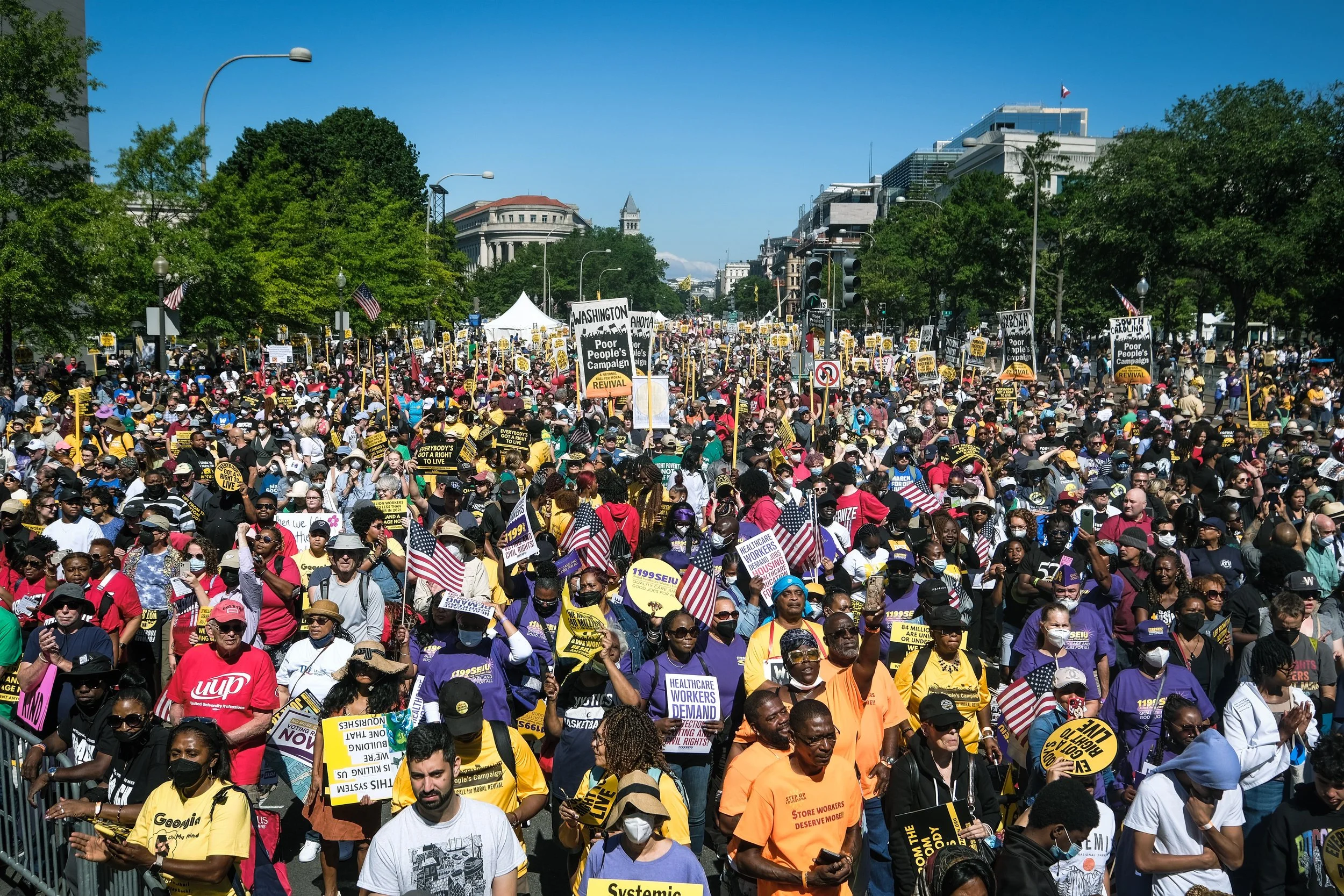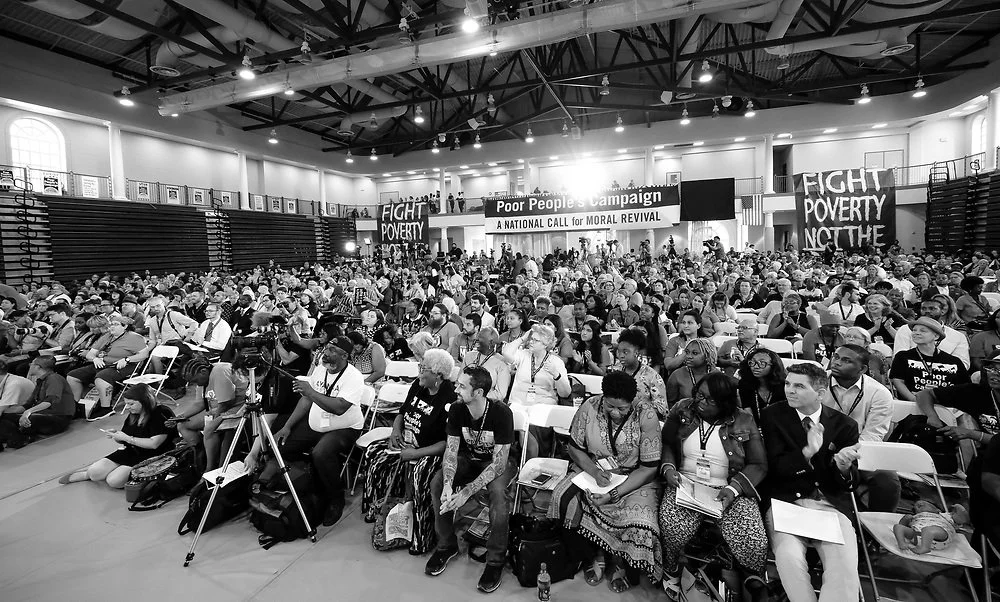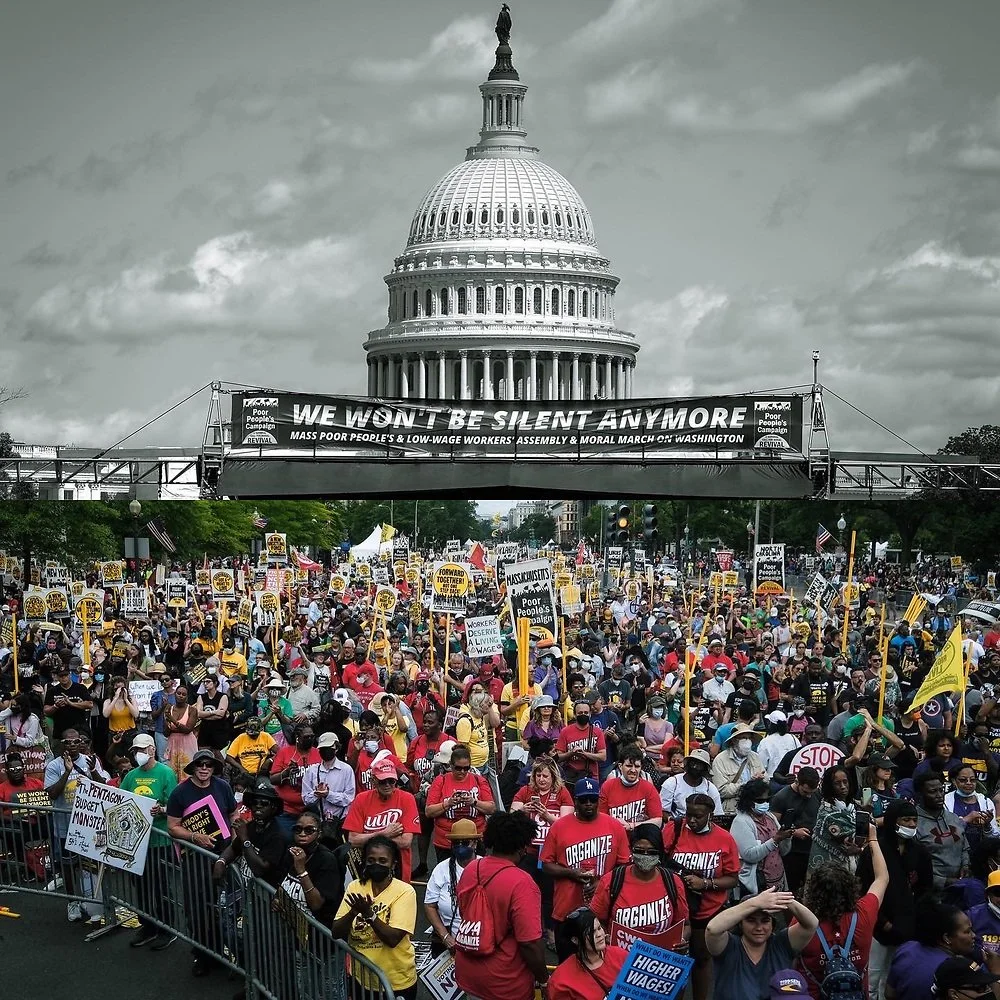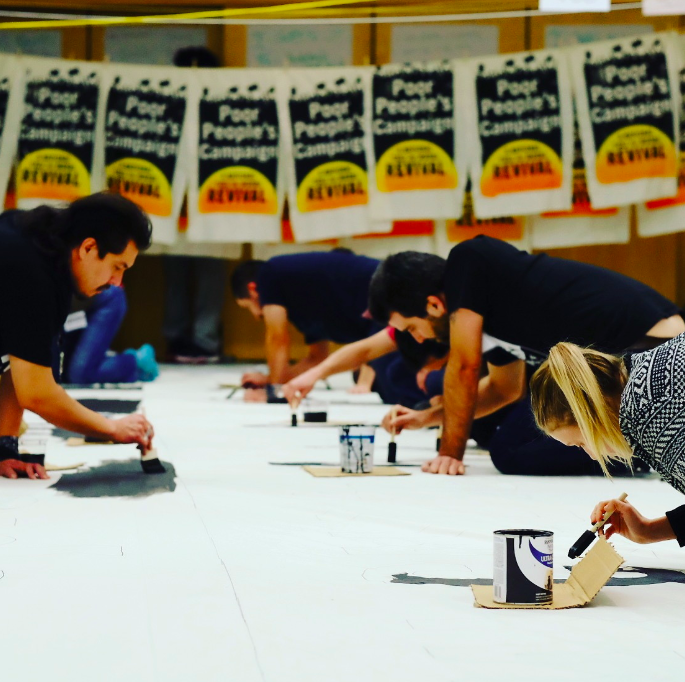Poor People’s Campaign: A National Call for Moral Revival
Repairers of the Breach is co-anchor of the Poor People’s Campaign: A National Call for Moral Revival. Drawing on the unfinished work of the Southern Christian Leadership Conference, under the leadership of Rev. Dr. Martin Luther King, Jr., the National Welfare Rights Organization, worker’s rights movements, women’s rights movements, religious leaders, and people of all races who launched the Poor People’s Campaign in 1968 and called for a “revolution of values,” today’s Poor People’s Campaign is a growing national movement organized to challenge the interlocking issues of systemic racism, systemic poverty, the war economy, ecological devastation, and the distorted moral narrative of religious nationalism.
Over the past few decades, we have witnessed the scaling back of anti-poverty programs, the lack of wage increases, the suppression of voting rights, and the increased incarceration of Black and brown communities. These are only some of the causes of the growing inequality in our nation. There are over 140 million poor and low-income people in the U.S. (this includes almost 39 million children, nearly 59.7% of Black people (23.7 million), 64% of Latinx people (38 million), 59% of indigenous people (2.14 million), and 33.5% of white people (65 million poor white people). Still, economic justice issues have remained on the fringes of our nation's public and political discourse for decades.
In 2016, we joined forces with religious leaders across the country for “The Revival: Time for A Moral Revolution of Values." At the invitation of over twenty local communities, we held Moral Revivals in the poorest communities across the country. We met with Black, White, Brown, and Native American leaders who were seeking a new moral vision and strategy to combat the systemic poverty issues in their states. We held a day-long training with impacted people, clergy, and advocates and walked through the history of the reconstruction periods in America and the interlocking nature of systemic injustices from the state to the national level. We wanted to gauge the appetite for the kind of moral organizing that had been successful in the North Carolina Forward Together Moral Movement, and the response was overwhelming. The states from our 2016 Revival would later become a part of the founding State Coordinating Committees of the Poor People’s Campaign.
In 2017, Repairers of the Breach partnered with the Kairos Center for Religions, Rights, and Social Justice, and hundreds of local and national organizations, to launch the Poor People’s Campaign: A National Call for Moral Revival.
Today, Repairers of the Breach provides leadership, organizing, policy, strategy, media, cultural arts, and partnerships support to the Campaign. Our organizers support over 30 state coordinating committees, building networks across state lines, providing training on movement-building skills, supporting existing local organizing, and collaborating with local partners to mobilize towards the Campaign’s goals.
The goals of the Poor People’s Campaign are to:
Shift the narrative by reframing the causes of systemic poverty and providing new data on poverty and its effects,
Build a powerful and diverse movement of people that can dismantle unjust systems and achieve lasting social change through social and political action, and
Implement a Third Reconstruction Agenda that fully addresses the needs of poor and low-wealth people.








Photo Credit: Kevin A. Smith and Steve Pavey
2022
Mass Poor People's and Low-Wage Workers Assembly and Moral March on Washington
Using the moral fusion organizing model in which Repairers of the Breach has trained thousands of community-based leaders over the years, we focused our mobilizing in late 2021 and early 2022 on the Mass Poor People's and Low-Wage Workers Assembly and Moral March on Washington on June 18, 2022.
We assembled to give poor and low-wealth people a national platform from which to tell their own stories and make their demands to elected leaders.
We assembled to demand immediate and transformative action to address the vast interlocking injustices in our nation.
We assembled to show the power of a moral fusion coalition.
We assembled to engage in a nationwide teach-in teach by presenting the state of affairs, putting a face on the state of affairs, and ending with a commitment to intensify our action in our communities following the assembly.
The Assembly included workers, families, children, youth, faith leaders, labor unions, environmental, and civil rights groups, representing a powerful and diverse coalition of over 200 organizations fighting to address systemic poverty and racism, gun violence, immigration, voter suppression, environmental devastation, militarism, and many other interlocking issues. Our organizing model has always built connections between organizations and people who often work in silos. June 18 brought communities of different races, identities, backgrounds, and beliefs together. We represented a moral resurrection amidst great division. The Assembly illustrated how interconnected social justice work is and the kind of fusion power we need to create to save our democracy and change this nation. As one attendee put it - "This campaign's consciousness is growing and unstoppable."
A Poor People’s Pandemic Report.
Mapping the Intersections of Poverty, Race and COVID-19. The Poor People’s Pandemic Report exposed the glaring omissions in collecting and disseminating data on poverty in the US as it relates to the pandemic. It showed how the pandemic exacerbated preexisting social & economic disparities.
Over 5 Million Poor and Low Wealth Voters Contacted!
During the 2022 mid-term election season, the Poor People’s Campaign intensified its non-partisan voter mobilization effort to encourage voter participation in poor and low-income communities in 15 states (WI, TX, SC, PA, OH, NC, MS, MI, ME, KY, IL, GA, FL, AK, and AZ). From September through November, we canvassed communities educating them about the issues, hosted a national text-banking program, encouraged voter registration, and partnered with local and national organizations. We surpassed our goal of reaching 5 million poor and low-income voters.
2021
Third Reconstruction: Fully Addressing Poverty & Low Wages From the Bottom Up.
On May 20, 2021, the co-chairs of the Poor People’s Campaign, Rev. Dr. William J. Barber, II and Rev. Dr. Liz Theoharis, joined Representatives Pramila Jayapal and Barbara Lee as they announced a non-partisan congressional resolution to support this movement, entitled: Third Reconstruction: Fully Addressing Poverty & Low Wages From the Bottom Up.
This historic effort comes as a response to years of movement-building and emerges from the pain and organizing power of the 140 million. It reflects an omnibus vision to restructure our society from the bottom up, recognizing that in order to build a true Third Reconstruction we must simultaneously deal with the interlocking injustices of systemic racism, poverty, ecological devastation and the denial of health care, militarism and the distorted moral narrative of religious nationalism that blames the poor instead of the systems that cause poverty.
Waking the Sleeping Giant.
“Waking the Sleeping Giant: Poor and Low-Income Voters in the 2020 Election”, demonstrates the impact and importance of poor and low-wealth voters on the electorate and the need to engage with policy issues that directly impact them, like living wages and voting rights.
2020
Mass Poor People's and Low-Wage Workers Assembly
On June 20, 2020, the Poor People Campaign, along with 43 state coordinating committees, 200 mobilizing partners, and religious bodies, advocates, and artist-activists successfully reorganized the Mass Poor People’s Assembly and Moral March on Washington into a 3.5-hour digital justice gathering. The digital march focused on the 140 million poor and low-income people in the U.S. Impacted people spoke directly to the nation and shared their personal experiences with systemic racism, systemic poverty, the war economy and militarism, ecological devastation, and the distorted moral narrative of religious nationalism. Over 2.5. A million viewers joined on Facebook, and over 240,000 letters were sent to governors and Congress members to support the newly released Poor People’s Moral Justice Jubilee Policy Platform.
Unleashing the Power of Poor and Low-Income Americans.
The report, “Unleashing the Power of the Poor and Low-Income Americans: Changing the Political Landscape,” provides a closer look at the voting behaviors of poor and low-income people relative to the size of the total electorate and recent voting margins by state. The findings support our analysis that organizing among the poor around a moral agenda that represents the concerns of the poor can fundamentally change the political map of this country and lead to policies that are just and representative for all Americans.
2019
First Biennial Poor People’s Moral Action Congress
In June 2019, we held the first Poor People's Moral Action Congress in Washington, D.C., a year after the Campaign’s launch. The Congress was established to deepen the political knowledge and analysis of our state volunteer leaders, train and equip new and continuing state leaders with the tools necessary for building a successful Campaign in their states, and significantly impact the state and national political discourse by shifting the narrative to address the interlocking injustice of systemic racism, systemic poverty, the war economy, ecological devastation, and the distorted moral narrative of religious nationalism affecting over 140 million and poor and low-wealth people.
Over one thousand people from across forty states attended the first Moral Action Congress. On day one, we held a forum with nine 2020 presidential candidates, where each candidate committed to addressing the five interlocking issues of the Poor People's Moral Agenda. We also released a Moral Budget demonstrating the economic benefits of adequately addressing these interlocking issues. On day two, we conducted over twenty moral fusion organizing trainings and workshops. On the third and final day, the Poor People's Campaign state leaders and national co-chairs testified on Capitol Hill in front of the U.S. House Budget Committee, where key members of Congress reviewed the Campaign's findings and agreed that the government must do something about the alarming rate of 140 million poor and low-income people living in America.
The convening was a huge success, and the training and organizing that occurred during the gathering propelled the Campaign into a powerful 22 states tour in the fall of 2019, which included mass meetings, training, canvassing, voter education, and mobilization for the Mass Poor People's Assembly on June 20, 2020.
Poor People’s Moral Budget.
“The Poor People’s Moral Budget looks at policies and investments for seven critical areas of the Poor People's Moral Agenda: 1) democracy and equal protection under the law; 2) domestic tranquility; 3) peace and the common defense; 4) life and health; 5) the planet; 6) our future, and 7) an equitable economy. In each case, we've found that our nation has abundant resources to meet the demands of the poor, and to address the widespread and systemic injustices we face.
2018
Poor People’s Campaign: A National Call for Moral Revival Was Launched.
In 2017, Repairers of the Breach partnered with the Kairos Center for Religions, Rights, and Social Justice, and hundreds of local and national organizations, to launch the Poor People’s Campaign: A National Call for Moral Revival. In the spring of 2018, after 40 days of Moral Fusion Direct Action which included nationwide mass education, religious services, theomusicolgy gatherings, and direct action, we gathered in DC to launch the campaign. Over the 6-week period, over 30,000 people participated in 200 nationwide actions, and over 5,000 people engaged in nonviolent direct action to bring national attention to the policy violence in our nation.
The Souls of Poor Folk, April 2018
“The Souls of the Poor Folk “ is an empirical study that demonstrates the direct link between extremist policies and poverty in America and adopts an intersectional approach to analyzing and identifying remedies for the evils identified by the Campaign: Systemic Racism, Poverty, Militarism, Ecological Devastation and the Distorted Moral Narrative of Religious Nationalism.













